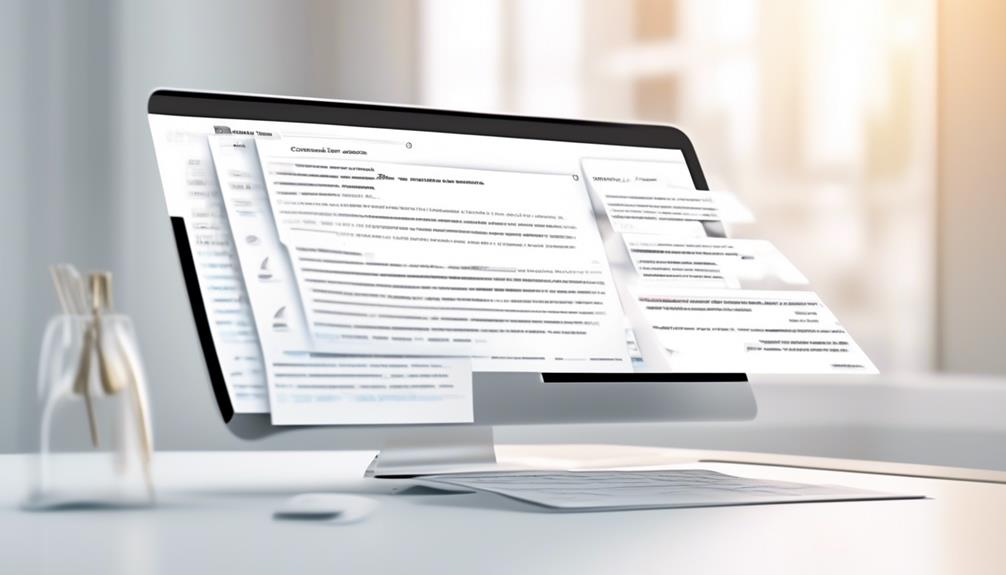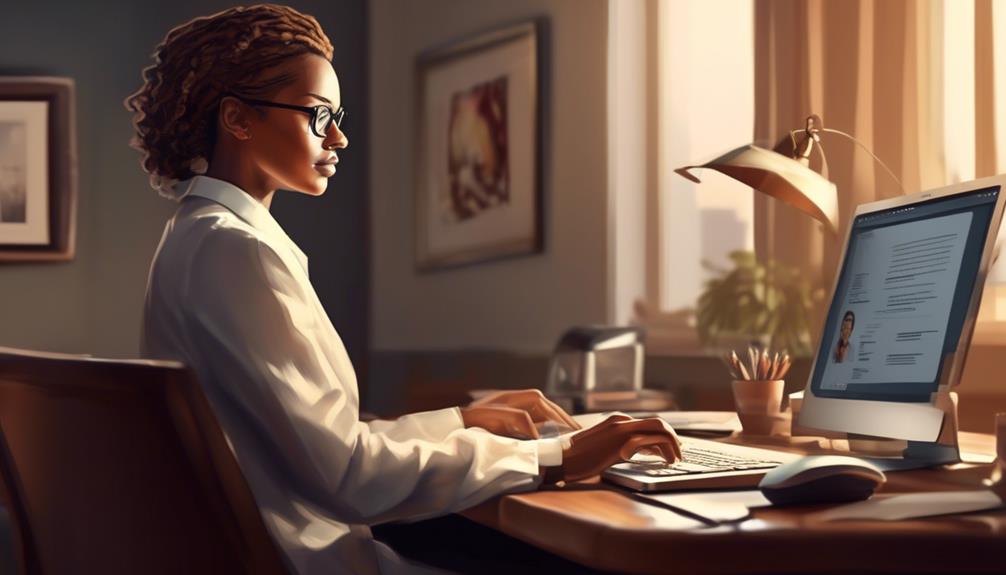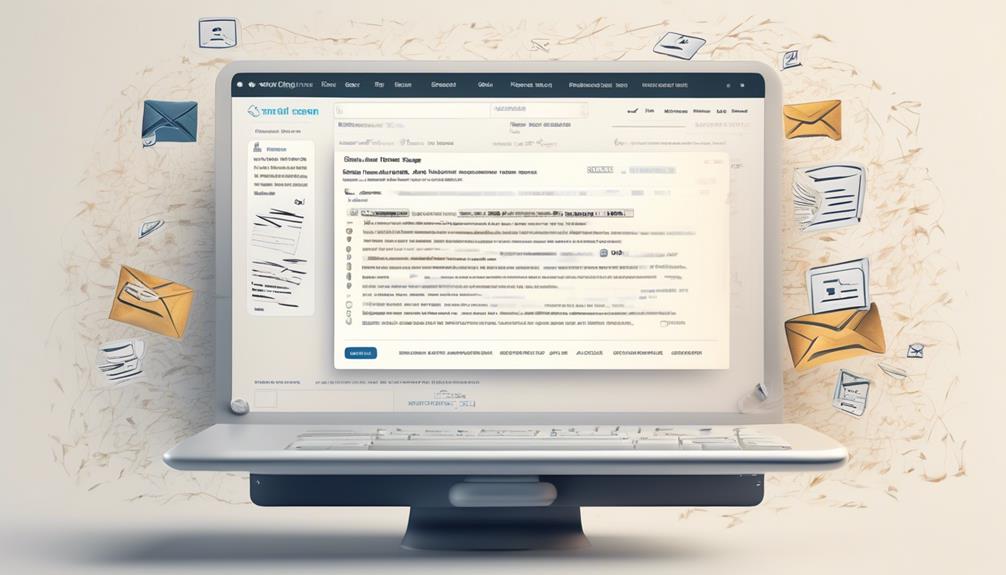When we send an email to a counselor, our goal is to write a message that is not only professional but also successful in communicating what we require.
It's crucial to strike a balance between being respectful of their time and ensuring that we articulate our concerns in a manner that is clear and concise.
With a few key strategies in mind, we can navigate the process of composing an email that paves the way for a productive dialogue with a counselor.
Key Takeaways
- Use a professional and respectful salutation, addressing the counselor by their appropriate title and last name.
- Clearly state the purpose of the email and what you hope to achieve through counseling.
- Use clear and concise language, avoiding jargon or complex sentences, and maintain a polite and professional tone throughout the email.
- When requesting an appointment, clearly communicate the purpose and availability in the email subject line, express gratitude, specify preferred mode of communication, provide available days and times, and inquire about the price per session if necessary.
Crafting a Professional Salutation
Crafting a professional salutation for an email to a counselor involves using the therapist's first or last name in a respectful and appropriate manner. When addressing a counselor for the first time, it's crucial to convey a sense of professionalism and respect. This sets the tone for the relationship and demonstrates your understanding of therapeutic boundaries.
Whether it's a phone or video call, the initial email sets the stage for future interactions. When deciding on the subject line, it's important to be clear and concise. For instance, using a subject line such as 'Scheduling Our First Session' or 'Inquiry About Counseling Services' can effectively communicate the purpose of your email.
We look forward to our first interaction with the counselor and are eager to establish a positive and productive rapport. When using the therapist's title, ensure to use 'Dr' if the therapist has a PsyD or Ph.D. This attention to detail reflects your commitment to professionalism and sets the stage for a successful therapeutic relationship.
Structuring the Email Introduction

How can we effectively introduce ourselves in an email to a counselor without sounding too formal or too casual?
When composing the first email to a therapist, it's essential to strike a balance between professionalism and warmth in the introduction. A sample email to a counselor should begin with a clear and concise subject line that reflects the purpose of the email.
Next, start with a polite greeting, addressing the counselor by their title and last name to show respect. Introduce yourself briefly, mentioning where you found their contact information and explaining your situation. Clearly state the reason for reaching out and what you hope to achieve through counseling.
Additionally, express your interest in seeking help and inquire about the counselor's availability and the possibility of scheduling a consultation. This structured approach ensures that the email is respectful and professional while also conveying warmth and openness.
Conveying Your Message Clearly
Gathering relevant information and organizing your thoughts are essential for conveying your message clearly in an email to a therapist. When composing an email for online therapy, it's crucial to ensure that your message is straight to the point and effectively communicates your needs.
To achieve this, make sure to:
- Use clear and concise language: Avoid using jargon or overly complex sentences. Get straight to the point to ensure the counselor understands your concerns.
- Organize your email with a clear structure: Use headings or bullet points to break down your thoughts and make it easier for the therapist to follow your message.
- Proofread and edit for clarity: Before sending the email, review it for coherence and ensure that it effectively conveys your thoughts and feelings.
- Use a professional and polite tone: Maintain a respectful and courteous tone throughout the email to convey your message clearly while showing consideration for the therapist's time and expertise.
Requesting an Appointment

When requesting an appointment with a counselor, it's important to clearly communicate the purpose and your availability in the email subject line. This helps the counselor to quickly understand the nature of your request and consider their availability.
In the body of the email, it's a good idea to express your gratitude for the opportunity to schedule an appointment, and to specify your preferred mode of communication, whether it's in-person, over the phone, or via video call.
For example, you could say, 'I would like to schedule an appointment for next week to discuss strategies for managing stress. I'm available on Monday and Wednesday afternoons, or Tuesday and Thursday mornings. Please let me know if any of these times work for you.'
It's also important to inquire about the price per session if the counselor's fee structure isn't readily available. You can politely ask, 'Could you please let me know the price per session?' This shows respect for the counselor's time and consideration.
Inquiring About Counseling Services
We are interested in seeking counseling services and would like to inquire about your specialization and availability. As we consider taking this important step, it's crucial to find the right therapist for the first meeting.
Here are some things we'd like to work through in our initial session:
- Specialization: We're interested in understanding your areas of expertise and experience. Knowing your specialization will help us determine if your approach aligns with our needs.
- Availability: Knowing your availability for sessions is important for us to plan accordingly. We'd like to inquire about the days and times you have open for appointments.
- Consultation: If possible, we'd appreciate a brief consultation to discuss our needs and how you may be able to assist us. Please let's know if this is a possibility.
- Upcoming Meeting: We're eager to take the next step and are looking forward to the potential of working with you. Please provide us with available dates and times for a session, so we can plan accordingly.
We hope to hear from you soon and are grateful for your time and consideration.
Frequently Asked Questions
How Should I Start an Email to My Counselor?
We should start the email to our counselor by addressing them respectfully, introducing ourselves, and mentioning where we found their contact information.
We need to briefly explain why we're seeking therapy and inquire about their availability within a specific time window. It's also important to ask about the possibility of a phone or video call consultation.
Keeping the email short and concise is crucial to ensure it's easy for the counselor to read and respond.
How Do You Address a Counselor in an Email?
Certainly!
When addressing a counselor in an email, it's essential to use proper salutations. Start with 'Hi, (First/Last Name)' or 'Hi, Dr (First/Last Name)' to show respect and professionalism.
Avoid using personal pronouns unless necessary and be direct when requesting an appointment. Remember to be concise and respectful in your communication.
Using these techniques will help in establishing a professional and respectful tone when addressing a counselor in an email.
How Do You Start an Email to an Advisor?
We start an email to an advisor by addressing them with their appropriate title and last name, keeping the tone professional and courteous.
We use a clear and concise subject line to introduce ourselves and state the purpose of our email.
We may request a meeting or specific information.
It's important to maintain a respectful and formal tone throughout the email, ensuring clarity and conciseness in our communication with the advisor.
How Do You Address a Therapist in an Email?
We address a therapist in an email by using their first or last name in the salutation. If they've a PsyD or Ph.D., we can use 'Dr.' in the salutation. It's best to avoid personal pronouns unless we're certain.
If the therapist is too busy, we can ask for referrals, as not all therapists may have availability. We should request a consultation with the therapist by asking for their availability within a specific time window.
Conclusion
We hope this guide has been helpful in understanding how to write an effective email to a counselor.
Did you know that according to the American Psychological Association, 50% of individuals who seek therapy experience significant improvement in their mental health within 8 sessions?
It's important to take the first step in reaching out for support, and we look forward to hearing from you.









